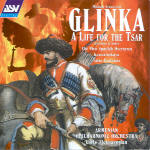While it’s generally accepted that Mikhail Ivanovich Glinka (1804-57) was the “father” of Russian music in the 19th century, his music is not performed very much today. Further, while historically important, Glinka’s output is relatively small (especially the orchestral music, a good bit of which is represented on this disc), although among his significant contributions was his liberation of Russian opera from its slavish imitation of Italian models with A Life for the Tsar (1836) and Ruslan and Ludmila (1842). Much of the action in “Tsar” concerns conflict with the Poles, hence the assortment of Polish dance music. It’s all lively and tuneful stuff–as is the Valse-Fantaisie (1856)–and you can hear traces of elements that would be mined by Borodin, Mussorgsky, Rimsky-Korsakov, and Tchaikovsky.
Kamarinskaya (1848) is a charmingly atmospheric if somewhat repetitive work that Tchaikovsky said contained the “seed” of all Russian music. Well, it certainly contained the same folk song he would later use in his own String Quartet No. 1. Glinka is credited with inventing the “musical picture postcard” with his two Spanish Overtures–Capriccio Brilliante (1845) on the jota aragonesa (which Mahler also used in his Third Symphony), and the lively and dancing Souvenir d’une nuit d’été à Madrid (1851). Loris Tjeknavorian and the Armenian Philharmonic turn in fresh and vibrant performances, marred only by the orchestra’s persistent intonation problems, particularly in winds and brass. Still, this brightly-recorded CD draws much deserved attention to Glinka’s historically significant if currently neglected musical contributions.
































